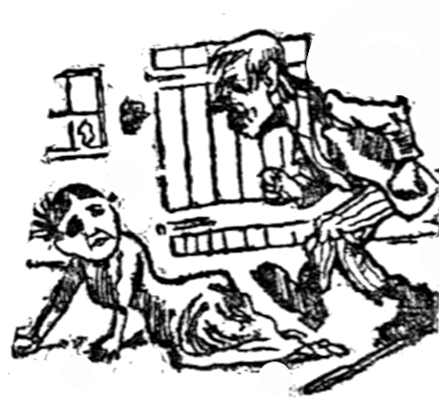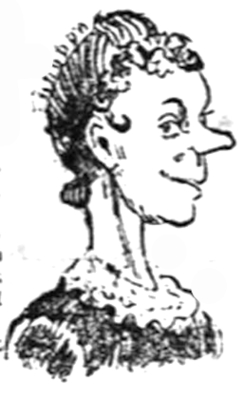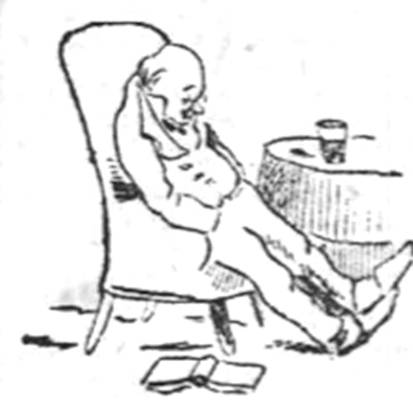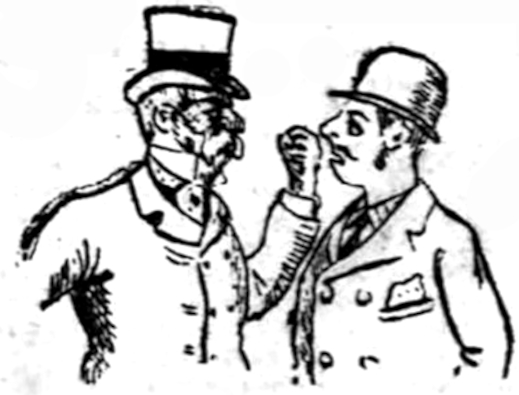This article has been transcribed from a copy of the Cardiff Times in the online collection of scanned Welsh newspapers 1804-1919 in the National Library of Wales, with grateful recognition of the free access accorded to all readers. Paragraph breaks have been introduced for easier reading.
Samuel here adopts the persona of what a hundred years later might be called a ‘sexist pig’. The difficulty for today’s reader is to interpret whether or not the fictional author’s views in the article, overt or implicit, are to be taken at face value, or are ironic. Samuel’s dislike of the amount of house-keeping money he has to provide, for example, is frequently met in throughout the series of articles, and is part of many a comic routine for centuries. So too is the fear expressed theatrically in the last lines, as his wife approaches, and may find him out. These are tropes of a now almost obsolete genre.
On the other hand we cannot gauge the seriousness of his objection to Mona Caird’s writing on women’s rights and to Caird herself. Where was the line drawn in the late nineteenth century between acceptable and objectionable opinions on these matters? It is true that there was, and was perceived to be, a growth in the number of men who chose to be bachelors, and a consequent belief that there were many women longing in vain for marriage, and throughout the series of articles called ‘Samuel’s Sentiments’ these women are mocked as hopeless and unattractive. There is a recurrent illustration of such a figure of ridicule. Women in general are seen as uneducated because unintelligent. Our problem in relation to the present article is an uncertainty as to how much Samuel wants us to take seriously. He casts himself as Richard III in the last line of the article, but we assume that he isn’t going to have his wife murdered. Even so we are disturbed by his image of a man’s murderous assault on his wife, because it is a joke in very bad taste by our standards. It is a further cause of mirth that the husband will be hanged.
So at no point in the article are we clear how to evaluate Samuel’s views on women, and in consequence how we are to read the essay. Even if Samuel is self-consciously adopting what today is an unacceptable position as part of a rhetorical strategy, this article as a whole is quite unpleasant. He disparages (Alice) Mona Caird (1854–1932), a novelist and women's suffragist, whose essay 'Marriage' (Westminster Review [complete text in The Victorian Web"">]) analysed the history of the abuse of women under the system of marriage, and provoked a series in the Daily Telegraph called ‘Is Marriage a Failure?’ (Mona is the Latin name of the Isle of Man or of Anglesey or ‘Ynys Môn’.) The illustration of a husband’s murderous attack on his wife hardly seems likely to amuse the lower-middle class, Liberal voting readers of the Cardiff Times, and perhaps it is ironic in a fashion we no longer understand.
‘Berry of Bradford’ was James Berry, Public Executioner, 1884-1892. The Family Herald: A Domestic Magazine of Useful Information & Amusement (1843–1940) was a weekly periodical which carried fiction and was aimed at a newly literate public. ‘Fatateul’ is possibly a misprint for ‘fatal’. (Fatateul is a real but unusual French surname.) Is it possible that it is an onomatopoeic rendering of the drum which accompanied the tumbril conveying prisoners to their execution during the French Revolution? ‘Ha, ha’ is not a laugh but was probably an Anglo-Norman exclamation of surprise or alarm at, for example, the sunken fence that was given the name of ‘ha’ha’, and which constituted a surprise to the galloping horse-rider. ‘I must dissemble’ is a line which in Henry VI Part 2 Shakespeare gives to the Duke of Gloucester (later Richard III). It provides the sense of an ending, and it is not often that we feel relief at finishing one of Samuel’s essays. —David Skilton

Is marriage a failure with the lady’s husband? Well, what do you think?
HIS question, sir, which has been raging so furiously in the Press, and started originally by one Mrs ‘Mona Caird,’ has actively agitated me for some days now, but I may say that in a desultory and spasmodic sort of fashion I have been reflecting on it most seriously ever since the fourth day of my honeymoon – which took place some years ago now. Mona Caird, it would appear from her original communication. has been a Mona, or rather moaner, under the thraldom of matrimony for a considerable period; indeed, it rather looks as though she never Caird for it. But there is too strong a flavour altogether about Mona's complaint; it has too strong a Bouquet (‘Mona Bouquet;’ twig, sir. You've been to the Isle of Man, of course. Haven't time to work up the pun properly), has the wail of Mona, and it does seem altogether strange that Mona should not care about Man, find I'm Manxious to know why such is the case! Had Mona and the people who have followed in her train asked, ‘Is Failure a Marriage?’ I should unhesitatingly have answered, ‘Yes,’ for the two frequently run hand in hand so far as the career and prospects of a young man are concerned. This fact, sir, conclusively remains, that nine out of ten of our novelists, dramatists, poets, who of course write primarily to be in accord with, and to please, the public, seem to think that both marriage is a failure and failure is a marriage, for they either end up their narrative with a ceremony at the halter – beg pardon, sir, altar; same thing you know – or they make marriage interesting (a la the French model; very popular and always well thumbed at the circulating libraries) by causing either the wife or the husband to ‘skip the noose,’ accompanied by another party, a change of raiment, and all the jewellery and petty cash available. That only shows what a good many literary people think about marriage – possibly because their own ventures are not always too happy. There is yet another certainty in regard to Mona's question, and that is that seventy per cent at least of all the bachelors of to-day are distinctly of opinion that marriage is a failure, as is evidenced by their insuperable reluctance to enter into the married state (see the Registrar-General's returns if you don't believe me) nowadays, whilst in the case of married men you will find that almost to a man they declare that marriage is a failure, a dire, distressful, awful failure, and a fraud, and the only exceptions almost to this rule are the men who have ‘wed a bit o' brass,’ as the local expression goes, and who have ‘niver struck a bat at after.’ The young men of to-day, sir are emphatically utilitarian rather than sentimental, and they have a due regard for that definition of marriage which says that it is ‘an insane desire to keep another man's daughter.’

This is emphatically an instance of incompatibility of temper. Berry of Bradford will probably have the divorcing of the husband, by dropping him a line.
I was, for the purpose of this communication to you, sir, reflecting the other day on the query which heads this article, when, as a sort of exemplification of how even the most trivial circumstances determine one's mind, Mrs Samuel sailed (I can only use that word, sir, so marked was the fluttering of skirts, apron, and other feminine appurtenances; all indicative, be it said, when thus in motion, of a ruffled and irascible disposition) into my den, and thus addressed me – ‘Smoking, eh? and lolling on the sofa? Thinking out ideas, I daresay,’ (palpable sneer at this point) ‘but I can't do it (probably not, so far as the ideas are concerned) when there is work to be done. That man has called about the gas account; he says we shall be cut off; (horrible thought) but what do you care? Nothing! My father always paid his way – he was forced to (probably), but do you want, to pay your way? (Not if I can help it!) Shuffle, shuffle, shuffle – that's how it is with you.

This lady wouldn’t mind trying whether marriage is a failure or not – if she had the chance.
Do you face the tradespeople? No. Here, the impudent milkman has been this morning; he says that, he won't give you any more chalk; (I hope not) he says that your excuses won't hold water (unlike his milk). But you don't care a bit. Here everybody can go off this summer, but your poor wife and children; you don't care whether they have a shoe to their foot so long as you can treat your precious friends[.] l'm tired of such goings on; I don't wonder that editors turn rusty with you; always behindhand except when there's some sort of badness stirring!’ and so on to the end of an interminable chapter. Such speeches as these, sir, fully resolve me that marriage is a failure, and having formed this opinion, I re-light my pipe and mentally conjure up before me a whole host of matrimonial drawbacks – let the reader distinctly understand that I am speaking always from the man's point of view – which can never be counter-balanced by any amount of the usual saccharine spooning and mooning that generally attends the early progress of love's young dream, which in my opinion is more of a nightmare than a dream.

This gentleman never tried marriage. He’s glad that he didn’t.
Yes, I conjure up all the picture, or series of pictures, before me. Look at the only too common specimen of a wife who has what are called ‘tantrums,’ the lady who has sudden fits of spleen and sulkiness for no assignable reason – the female person who sits moaning dismally, and who, when you ask her ‘What's up?’ replies in a most tragic and suggestive manner, ‘Nothing that I should complain about, of course, but you know better than I do." Think for a moment with patience, if you can, of the woman who goes to bed in a good temper at night and gets up next morning evidently resolved to play ‘steam’ all day – probably because it is washing day and she has some extra supervision to exercise. Look at the young woman who is gushing enough, but who reads the Family Herald all day, leaves her hair undone and neglects to darn your stockings and sew on your buttons. Look at the self-opinionated young female person who roasts your food till there is no nature in it, or boils everything to rags, or, on the other hand, tries to convince you that you are a savage and therefore need all your meat raw. Present her with a cookery book, and hint to her that appetising food well cooked promotes both the good temper and the digestion of a male being, and then hear her say that you have insulted her, that ‘her mother knew how to cook, and that she always cooked so and so exactly as,’ etc. Then take the lady who looks with deep and blind hatred and suspicion on all her husband’s friends, always imagining that they want to take some advantage of him, and who will neither allow, them to visit him (with any regard to mutual comfort) or him to visit them. And gaze upon that very common type of young modern wife who will gad about everywhere she can in the best dresses available, and who affects to be injured or neglected if you don't take her about to festivals that bore or that you loathe. She is always great at theatre going, and says that such and such an actor (some conceited and much overpraised cad who has probably been an utter waster in a good family, or a defaulting clerk; a by no means uncommon type on the stage) is ‘so handsome,[‘] and has such a ‘beautiful expression.’

Mothers-in-law are bad enough, in all conscience, – and how about a father-in-law, like this?
Is marriage a failure, indeed? Why, it is that period of servitude during which a man is but too often obliged to abandon sentiments and habits that are a part of his being, and to ape a species of outward civility to one who is not alone out of sympathy with him, but one whom he most probably despises utterly from an intellectual point of view. ‘All very well in this latter case,’ some may say, ‘but such a wife generally “looks up” to her husband because of his superior attainments and qualities;’ not a bit of it, in the majority of cases; mere human dolls and lumps of female humanity are so full of vanity and self-conceit that they either estimate their qualities at an unnatural pitch (and assert themselves accordingly) or they almost regard their husband's undoubted superiority as an insult to themselves, and are consequently in a normal state of peevishness. Marriage, my dear sir, is unquestionably a failure in the case of seven men out of ten, and if to-morrow the generality of men could legally slip the noose – slip it without incurring the world's censure and the eternal reproaches of the woman to whom they had been allied, they would – and gladly, too. No wonder that young men don[’]t go in extensively for marriage nowadays. They object to sinking their real sentiments both at their place of business and at home; they like a pound sterling to themselves rather than 8s for themselves and 12s for other people. As the old circus wheeze goes, ‘A man who has no wife never has a button to his shirt – but the married man very often hasn't a decent shirt to sew a button on.’ Far from holding that the state of bachelorhood is a selfish one I rather agree with the man of limited means who says, ‘I haven't money enough to marry the woman I have cherished as an ideal in my own mind; I couldn't live up to my ideal of comfort and gentility on my present means; I’ll remain single and live free from care, rather than go on struggling with a woman (and maybe a lot of bairns that I can't adequately start in life) on my hands. If women are so clever as they almost universally say they are, let them keep themselves, as I do myself. Why should I try to keep a wife, and render my life a long servitude when I can barely help myself, according to my own views of making this by no means too happy earthly existence as endurable as possible?’ A struggling young fellow – a young fellow who has not made a position, as the phrase goes – who gets married now-a-days is simply an ass – but hark! I hear the fatateul [sic – fatal?] step of Mrs Samuel approaching, and she may glance over my shoulder. Ha, ha; I must dissemble!
Last modified 24 February 2022